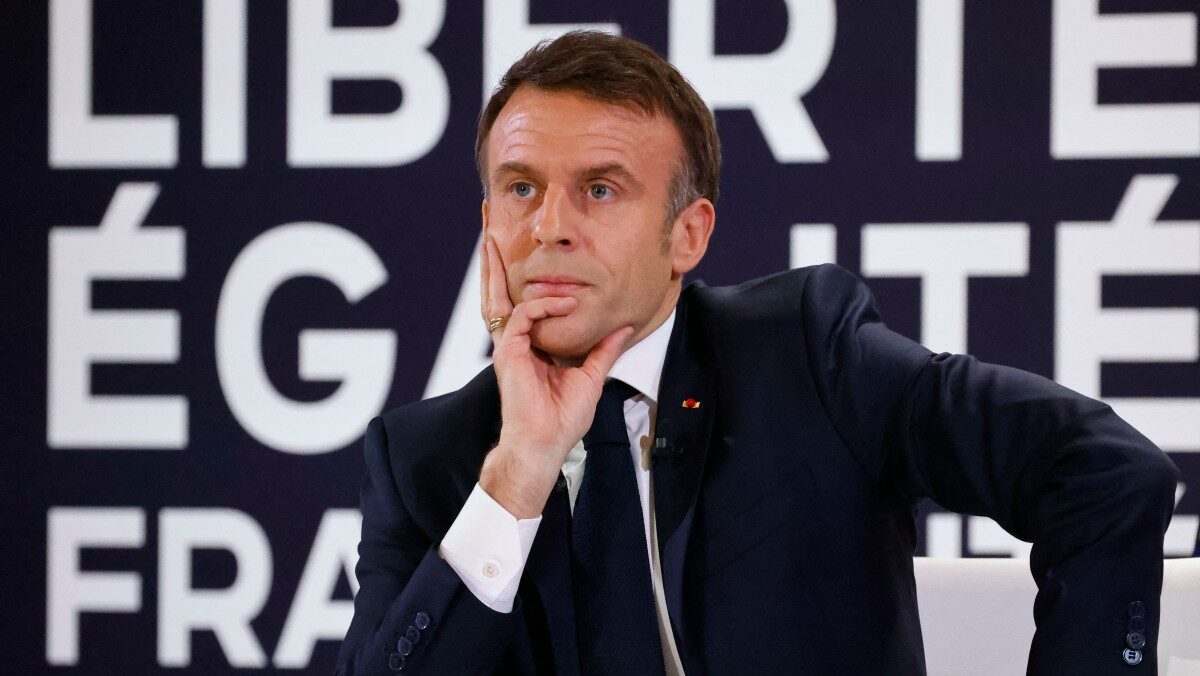
France’s President Emmanuel Macron reacts during a press conference to present the course for France’s newly appointed government at The Elysee Palace in Paris on January 16, 2024. The press conference, aired on several television channels at prime time, is the first such question-and-answer session hosted by the French President for almost five years.
Photo: Ludovic MARIN / AFP
In a bid to reinvigorate his mandate, and following the change of prime minister, French President Emmanuel Macron gave a press conference on Tuesday, January 16th in which he presented his priorities for the months ahead. His speech, however, was a scattershot series of announcements, characterised by proposed measures unlikely to make an impact.
Although Emmanuel Macron is scheduled to remain at the helm of France for another three-and-a-half years, there is already an end-of-reign atmosphere in the country, which the president is trying to ward off. The cabinet reshuffle at the beginning of January was intended to inject a little energy into a political life that had run dry.
At the lengthy press conference, the president announced the top priorities—but only vague plans—for his remaining term of office: economic growth, health, and education.
Macron intends to push through a new law designed to stimulate economic growth by simplifying standards and regulations while relaxing the minimum obligations placed on companies. His aim is “to put boldness and energy back into the system” and “to give greater freedom to those who do, who dare, who work.”
The man who, in years gone by, championed the ‘start-up nation,’ intends to return to the same frame of mind as when, as François Hollande’s Minister for the Economy in 2015, he had a law passed in his name, characterised by such emblematic measures as allowing the possibility of Sunday working.
Macron also announced a €2 billion tax cut for the middle classes by 2025, while signalling his intent to achieve full employment by 2027, in particular by tightening access to unemployment insurance.
Education is another of Macron’s priorities. His proposals on education are a hodgepodge of measures, many of which recycle old promises that were never fulfilled. Announcing that he wants to “rearm civic education” in schools, a series of familiar measures have resurfaced.
For example, he proposes experimenting with a “single outfit”—to avoid the overly connotative word ‘uniform’—which could be rolled out to all schools by 2026. Likewise, the return of civics classes was in the speech—a measure already announced by Pap Ndiaye but never implemented. The president also spoke in favour of a graduation ceremony, instituted as a “republican rite of unity, pride and recognition to make Republicans at the same time as transmitting knowledge.”
Finally, Macron announced that he wanted to introduce drama classes at secondary school, provoking jeers on social media since his wife, Brigitte Macron, is none other than his former drama teacher (whom he met when he was fourteen and she was nearly forty).
The President’s insistence on educational issues can be explained by the fact that he knows he is expected to address this sensitive issue. Gabriel Attal’s express passage to the Ministry of National Education, followed by his quick departure to become prime minister, has sharpened the public’s focus on this institution.
Attal was replaced by Amélie Oudéa-Castéra, criticised for being unsuitable for the job and for having chosen to send her children to a private Catholic school. As this controversy escalated, Emmanuel Macron ostensibly supported his new minister, calling for her individual choice for her children to be respected, but sending out a clear message that he intends to get personally involved in educational matters. Such intervention could absorb political pressure and compensate for any shortcomings of the incumbent education minister.
The last issue to attract the President’s attention during the press conference was health and the birth rate. The latest published demographic figures for France show a dramatic fall in live births, dropping below the 700,000 mark for the first time since 1946. To halt this precipitous decline, the president has announced two measures: the creation of birth leave to replace the current parental leave scheme, and a “plan to combat infertility.”
But these media-orchestrated measures only partially address the needs of families who would like to expand but lack childcare facilities, housing, and purchasing power. In a political paradox, at a time when the government is announcing that it wants to encourage the birth rate, the new Health Minister Catherine Vautrin announced an increase in abortion fees to encourage doctors to carry out abortions—proof of the current government’s inability to think in terms of family and culture of life.
Nonetheless, some feminist associations criticised Macron’s “pro-natalist” rhetoric as “profoundly contrary to women’s autonomy and a worrying political and social step backwards.”
At the end of the conference, the press endorsed the idea that Emmanuel Macron’s speech had become “right-wing.” The Left condemned his plan as “reactionary,” “old-fashioned” and “paternalistic.” On the Right, Rassemblement National criticised it as a hollow intervention dominated by an anti-RN obsession, while sovereignist MP Nicolas Dupont-Aignan deplored “unfair” decisions.
In fact, if there is anything even mildly ‘right wing’ in Macron’s action plan for the end of his five-year term, it is limited to a vague encouragement of entrepreneurial freedom, a framework for social benefits, and consideration of the birth rate in ways that have yet to be debated.
In addition to this presidential address, Prime Minister Gabriel Attal will deliver a general policy speech to members of parliament on January 30th.
